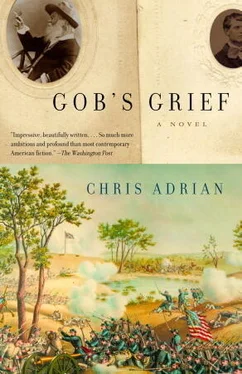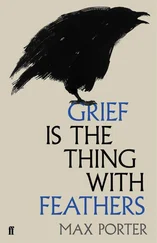Maci never sent this letter, or others that she wrote. It pleased her, sometimes, to imagine Aunt Amy in a fret over the disappearance of her niece, but she knew that Aunt Amy was not likely to fret over her. Finding Maci gone, Aunt Amy would have been angry, then relieved, and then fallen back into the comforts of quotidian sameness which Maci’s disappearance had briefly interrupted. Maci collected the letters in a bundle, and put them away in another rosewood box, her fourth, stuffed like the others with pictures and correspondence.
Maci rode down with Mrs. Woodhull to be with her when she delivered her memorial. It was Maci’s first time in Washington. “Mrs. Woodhull,” she said, peering out the window of the carriage when they rode by General Grant’s house on their way to their hotel, “when you are President, you’ll have to live in that big white barn.”
“Not if I move the capital to New York, my star.” That was Mrs. Woodhull’s pet name for Maci, inspired by the pseudonym, Arcturus, under which Maci wrote her articles, and by a certain spiritual radiance which, she claimed, hovered around Maci’s body, especially when ideas were hot in Maci’s head. Sometimes, as they worked together late into the night in the house on Thirty-eighth Street, Mrs. Woodhull would suddenly shield her eyes from Maci and say, “Oh, you are too bright, too bright!”
But it was Mrs. Woodhull who burned up the little room in Congress that day in January. She held the entire audience spellbound with her lucid argument. Maci’s lips moved along during the speech — she and Mrs. Woodhull had been over it so many times that Maci knew it by heart. Maci took great satisfaction in looking around the room at the rapt, attentive faces of all the powerful men and giant women. Only Mrs. Woodhull’s son, the younger Dr. Woodhull, spoiled the perfect attention. He’d brought a child with him into the room, a pale boy named Pickie, whom he claimed to have found in the snow in Madison Square Park a few weeks before.
The boy giggled whenever Dr. Woodhull whispered to him. A reporter standing next to them made hushing noises, but was ignored. Even Mr. Whitman, who Maci understood to be a friend even closer to Dr. Woodhull than was Dr. Fie, failed to quiet them when he tried. It didn’t really matter that they were whispering and giggling — no one was distracted from Mrs. Woodhull — but Maci found it outrageous that the lady’s own son should be so disrespectful towards her in her great hour. It irked Maci, how he did not act like her son, how he was not respectful towards her, how he showed her no affection. Maci’s mother was dead of a madness much less sublime than Mrs. Woodhull’s; her father was huddled uselessly on a cliff in Rhode Island. She wanted to rearrange fate, to effect a parent swap with him, and then she would see if he did not appreciate having Mrs. Woodhull for a mother. She wanted, at least, to take him aside, to scold him. “Don’t you know,” she would ask, “that your mother is extraordinary?”
There was something about him, though, which repelled her. Tennie described him as heavily electritized, and revealed to Maci, as if it were a precious secret, that he and Mr. Whitman were the two poles of a love-magnet. Maci did not know what that meant, and did not want to know, but she wondered, sometimes, if there were not a strange force in him. Whenever she went near him, on the rare occasions when he visited his mother’s house, she felt herself pushed away by something almost like panic. He is the Magus , her hand wrote. He is working to bring us back. What a celebration we would have here, if you would only speak to him. I tell you, there would be a parade! Sister, he needs your assistance.
“Brushing his hair, perhaps,” Maci replied, because it was always in a tangle.
It was after his mother’s memorial that Maci, compelled by her rage, finally spoke to young Dr. Woodhull. She found him outside the Capitol, watching Mr. Whitman play in the snow with the boy, Pickie. She stood behind him where he leaned on a stone railing, and gathered in her breath to shout at him. “How dare you!” is what she wanted to say, surprising him with a bombardment of fury. But she found she wasn’t able to shout at him after all. She let out the breath she had gathered, making a noise that sounded like a sigh.
Dr. Woodhull straightened up and turned around, stared a moment into her face, then turned back to watch his friend and his ward. Saying nothing, he stepped aside to make room for her to stand next to him. He began to gather up snow from off of the railing. Maci stared out at Mr. Whitman and the boy where they were frolicking around the ridiculous statue of General Washington. The boy climbed on the statue, kicking snow off of Washington’s lap and into Mr. Whitman’s face. “You rascal!” Mr. Whitman said. Her rage forgotten, Maci laughed at them.
“When I was a child,” she said, “my nurse discovered a copy of Leaves of Grass in my bed and beat me with it. She said it was a naughty book, and that I was a naughty child to read it.” Dr. Woodhull did a thing with his face — it might have been a smile or it might have been a grimace. He handed her a perfectly shaped snowball, then put his hands over his stomach.
“Are you ill?” Maci asked him.
“No,” he said. “Don’t ever tell Walt you got beaten with his book. It would make him sad.” He looked for a few moments at her shoes, cleared his throat, sniffed in the cold air. “Over there,” he said, pointing across the grounds to a building on the other side of Second Street. “Did you know that’s where they hung Mrs. Surrat?” Before she could reply he ran off to play. Maci considered her snowball, thinking she’d never seen anything so thoroughly round before in her life. It seemed like a sin to destroy it, but still she threw it against the wall of the Capitol, imagining it a perfect ball of fire, not ice, one that would set the place ablaze, and bring down the old order so she and Mrs. Woodhull could build it up again better and more just. The snowball behaved oddly, bouncing whole to the floor of the terrace before it exploded into a cloud of snow.
She watched the three playing for a while longer, until Mr. Whitman paused to stare at her. She thought for a moment that she should wave to him, but it seemed like an overly familiar gesture to make towards a stranger, so she turned and walked away.
I saw you. The veil is thick, but not obscuring to vision. We all see you. We see all of you. We watch you rend your clothes and pull your hair at our absence. You are destroyed because we are not with you, but do you ever consider how we are destroyed because you are not with us? Do you ever consider our grief? Selfish, selfish! O Sister, do you see what small sympathy exists on earth for the dead?
There was a time after Rob’s death when Maci went about in her aunt’s house with her hair in disarray and her dress torn, when she borrowed rituals of grief and devised her own — covering mirrors and putting out food for her brother to eat; standing for hours in the foyer in case a spiritual postman should come scratching ever so lightly at the door with a letter from him; saying a prayer every night for his sake — Lord bless him and keep him eternally in light and please tomorrow let him be alive. She’d lie in bed waiting in vain for sleep to come, and scenes from their life would play out in her head — hiding under Aunt Amy’s bed when she visited their house on Mount Vernon Street, and grabbing at her toes as she sat getting ready for sleep; dressing the dog; teaching the cat to swim in the washtub. Over the course of months she played out their whole lives, going back in time until she wrecked her little boat of reverie upon a first memory. She was two years old, taking a nap under the piano — a place she was fond of until she was seven — when Rob came and woke her. “Get up, you,” he said. He was unfriendly, back then, because he had wished to remain an only child. He hadn’t asked for a sister, and hoped at first that she might just go away without any fuss. She remembered hearing his voice, then opening her eyes and seeing him, and because it was her first memory, it seemed to her sometimes that it was he, not their parents, who had called her into creation, that she entered into life at the sound of his voice. In the weeks and months following his death, she ruminated on such strange notions. Back then she’d thought madness would be a blessing. It would be better to think constantly on beans than to think on him in his last moments, than to think on the wound in his throat, sucking and whistling, throwing out a spray of blood with every breath.
Читать дальше












